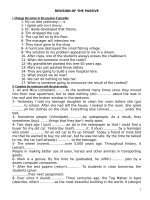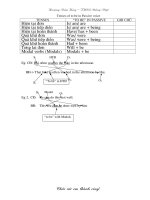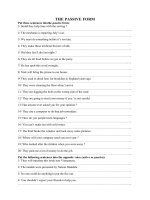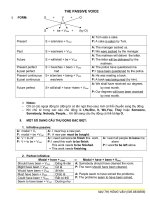THE PASSIVE VOICE
Bạn đang xem bản rút gọn của tài liệu. Xem và tải ngay bản đầy đủ của tài liệu tại đây (252.47 KB, 5 trang )
<span class='text_page_counter'>(1)</span><div class='page_container' data-page=1>
<b>4. Động từ thường chia ra làm hai loại: nội động từ (intransitive verbs) và ngoại động từ (transitive </b>
<b>verbs)</b>
4.1. Nội động từ
• Nội động từ diễn tả hành động nội tại của người nói hay người thực hiện hành động.
Ví dụ:
- He walks. (Anh ấy đi bộ - Anh ấy tự đi chứ không phải là do người hay vật khác tác động)
- Birds fly. (Chim bay - Con chim tự bay theo bản năng chứ không do người hay vật tác động)
• Nội động từ khơng cần có tân ngữ trực tiếp đi kèm. Nếu có thì phải có giới từ đi trước và cụm từ này sẽ đóng vai
trị ngữ trạng từ chứ không phải là tân ngữ trực tiếp.
Ví dụ:
- She walks in the garden.
- Birds fly in the sky.
<b>4.2. Ngoại động từ </b>
• Ngoại động từ diễn tả hành động gây ra trực tiếp lên người hoặc vật.
Ví dụ: The cat killed the mouse.
• Ngoại động từ ln cần thêm yếu tố bên ngoài là một danh từ hay đại từ theo sau để hoàn thành nghĩa của câu.
Danh (đại) từ đi theo sau ngoại động từ là tân ngữ trực tiếp.
Trong câu trên chúng ta khơng thể nói “The cat killed” rồi dừng lại được mà phải có “the mouse” đi kèm theo sau.
“The mouse” là tân ngữ trực tiếp của “killed”.
<b>4.3. Chú ý:</b>
- Sự phân chia nội động từ và ngoại động từ chỉ là tương đối, vì trong câu này, động từ ấy là nội động từ nhưng
trong câu khác nó lại là ngoại động từ. Xem xét những ví dụ sau:
- The door openned. (Cửa mở) - nội động từ
She opened the door. (Cô ấy mở cửa) - ngoại động từ
- The bus stopped. (Chiếc xe buýt dừng lại) - nội động từ
The driver stopped the bus. (Tài xế dừng xe buýt lại) - ngoại động từ
- The bell rings. (Chuông kêu) - nội động từ
He rings the bells. (Ơng ấy rung chng) - ngoại động từ
- The glass broke. (Cốc vỡ) - nội động từ
The boy broke the glass. (Cậu bé làm vỡ cốc) - ngoại động từ
- His lecture began at 8pm. (Bài giảng của ông ta bắt đầu lúc 8h tối) - nội động từ
He began his work at 8pm. (Anh ấy bắt đầu công việc lúc 8h tối) - ngoại động từ
<b> Thể của </b>
<b>động từ</b>
I. Thể chủ động: Là cách đặt câu trong đó chủ ngữ đứng vai chủ động, chủ thể của hành động.
Ví dụ:+ She learns Chinese at school
+ She bought a book.
<b>II. Thể bị động: Câu bị động được dùng khi muốn nhấn mạnh đến đối tượng chịu tác động của hành </b>
động hơn là bản thân hành động đó. Thời của động từ ở câu bị động phải tuân theo thời của động từ ở
câu chủ động.
<b>• Sau đây là bảng tóm tắt:</b>
<b>Thì</b> <b>Dạng bị động</b>
The simple present tense Is/ am/are + P2
The present progressive tense Is/am /are + being + P2
The present perfect tense Have/has + been + P2
The simple past tense Were/was + P2
The past progressive tense Were/was + being + P2
The past perfect tense Had + been + P2
The simple future tense Will + be + P2
The future progressive tense Will + be + being + P2
The future perfect tense Will + have + been + P2
The near future tense Is/are/am + going to + be +
P2
<b>Ví dụ:</b>
+ She learns Chinese at school. --> Chinese is learnt at school by her.
+ She bought a book. -->A book was bought by her.
</div>
<span class='text_page_counter'>(2)</span><div class='page_container' data-page=2>
-->A great of property is destroyed by hurricanes each year.
+ The tornado destroyed twenty houses. -->Twenty houses were destroyed by the tornado.
+ They are cleaning the room at the moment. --> The room is being cleaned at the moment
+ They were cleaning the room when I came yesterday.
–> The room was being cleaned when I came yesterday.
+ The company has ordered some new machines.
–> Some new machines have been ordered by the company.
+ Nam will give me a book tomorrow. –> I will be given a book tomorrow by Nam.
<b>Chú ý: </b>
– Trong câu bị động, chúng ta có thể lược bỏ "by ..." (bởi ai đó) khi chủ ngữ đã bao hàm người thực
hiện hành động
Ex: I have done my homework. -> My homework has been done
– Nếu câu chủ động có hai tân ngữ (trực tiếp và gián tiếp), chúng ta có hai cách chuyển đổi:
Ex: He gave me some apples.
–> I was given some apples.
–> Some apples were given to me.
Tuy nhiên, chúng ta ưu tiên cách chuyển đổi đưa tân ngữ chỉ người lên làm chủ ngữ trong câu bị động.
- đối với vật chất gây trạng thái, dùng “with’ thay cho “by”
Ex: Smoke filled the room → The room was filled with smoke.
<b>III. Một số dạng chuyển đổi đặc biệt từ chủ động sang bị động</b>
<i><b>1. Dạng bị động của </b><b>động từ khuyết thiếu</b></i>
Somebody can/may/must/ought to/should/have to + do something
→
something can/may/must/ought to/ should/ have to + be + done
Ví dụ: We should keep the room tidy.
→ The room should be kept tidy.
He can do the task with great care.
→ The task can be done with great care by him.
2.
Somebody + want/ like/expect + someone to do something
→
Somebody + want /like/expect + something + to be done
Ví dụ: + The teacher wants us to prepare our lessons carefully.→ The teacher wants our lessons to be
prepared carefully.
+ They expected me to finish my work early. → they expected my work to be finished early.
+ He wants someone to take some photographs. - > He wants to have some photographs taken.
+ He likes people to call him
“
Sir”
- > He likes to be called“
Sir”
<i><b>3. Câu với: advise, beg, order, recommend, urge, …</b></i>
S1 + advise,<b>…</b>+ O (person) + to V + O (thing)
- > S (person) + be + advised, <b>…</b>+ to V + O (thing)
or: S1 + advise, <b>…</b>+ that + S (thing) should be + P2 (to V)
Eg: + He urged me to clean the room. -> I was urged to clean the room. (or: He urged that the room should be
cleaned)
+ She decided to rebuild the house
→ She decided that the house should be rebuilt.
<i><b>4. </b></i>
<i><b>Câu với:</b></i>
<i><b> agree, be anxious, arrange, be determined, determine, decide, demand …</b></i>
S1 + agree, <b>…</b>+ to V + O -> S1 + agree, <b>…</b>+ that + S (of O) + should be + P2 (of to V)
Eg: He decided to sell the house. - > He decided that the house should be sold.
<i><b>5. Câu với</b></i>
<i><b> Sentence with : insist, propose, recommend, suggest …</b></i>
S1 + suggest, + Ving + O - > S1 + suggest, <b>…</b> <b>…</b> + that + S (of O) + should be + P2 (of Ving)
Eg: He recommended using a map. -> He recommended that a map should be used.
<i><b>6. Bị động với need</b></i>
S vật + need(s) + doing → S vật + need(s) + to be done
Ví dụ: + The house needs cleaning → The house needs to be cleaned.
+ The chickens need feeding → The chickens need to be fed.
<i><b>7. Câu với động từ chỉ ý kiến</b><b>: (V*): acknowledge, assume, believe, claim, consider, estimate, feel, find, </b></i>
<i><b>know, presume, report, say, suppose, think, understand, … </b></i>
People, They + (V*) + that + S + (V2)
It (be) + P2 (V*) + that + S + (V2)
</div>
<span class='text_page_counter'>(3)</span><div class='page_container' data-page=3>
Ví dụ: + People think he drives dangerously.
→ Cách 1: It’s thought that he drives dangerously.
→ Cách 2: He is thought to drive dangerously.
+ People think he is a good teacher.
→ It is thought that he is a good teacher.
→ He is thought to be a good teacher.
+ People say he was a teacher.
→ It’s said that he was a teacher.
→ He is said to have been a teacher.
7. It’s your duty to do something → You are supposed to do something (bổn phận của bạn là….)
Ví dụ: It’s your duty to lock all the doors. → You are supposed to lock all the doors.
8. S + make/ help + O (person) + V
<i><b> </b></i>
<i><b> - > S + be made/ helped + to V</b></i>
Eg: + He made me do a lot of exercises. - > I was made to do a lot of exercises.
+ He made me stay outside yesterday. → I was made to stay outside yesterday.
<b> S + let + O + V </b>
<b> -> S + be let + V</b>
Eg: They let me walk about the camp. - > I was let walk about the camp.
+ The teacher let us go home early last week. → We were let go home early last week.
<i><b>9.</b><b> Causative form: (B</b><b>ị động ngoại tác thể</b><b>)</b></i>
1. S + have + O (person) + V + O (thing) -> S + have + O (thing) + Vp2
eg: + I had him repair my bicycle yesterday -> I had my bicycle repaired yesterday
+ He had his waiter carry the luggage home. → He had the luggage carried home by the waiter.
2. S + get + O (person) + to V + O (thing) -> S + get + O (thing) + V p2
eg: + I get her to make some coffee -> I get some coffee made
+ I got the postman to post the letter for me. → I had the letter posted for me by the postman.
<i><b>10. Imperative sentence.</b></i>
(+) V + O + (Adverb) - > Let + O + be + P2 (of V) + (Adverb)
Eg: Write your name here. - > Let your name be written here.
(-) Don t V + O + (Adberb) -> Don t let + O + be + P2 (of V) + (Adverb)<b>’</b> <b>’</b>
Eg: Don t lend him any money. - > Don t let him be lent any money.<b>’</b> <b>’</b>
<i>(-) Don’t do something → something musn’t be done</i>
<b>Ex : Don’t touch this switch </b>→ This switch musn’t be touched
<i><b>11. Câu với: begin and continue</b></i>
S + begin/ continue + to V/ Ving + O - > S (of O) + begin/ continue + to be P2 (of to V/ Ving)
Eg: We will continue to use this computer. - > This computer will continue to be used
<i><b>12. </b><b>Động từ tri giác</b><b>: See, watch, hear, notice, obserb, smell, taste …</b></i>
S + verbs of perception + O + V + <b>…</b>-> S + be + P2 (verb of perception) + to V
S + verbs of perception + O + Ving + <b>…</b>-> S + be + P2 (verb of perception) + Ving
Eg: They saw her come in - > She was seen to come in.
I saw her going to work this morning. - > She was seen going to work this morning.
<i><b>13. Ch</b><b>ủ ngữ giả</b></i>: It be + adj for sb to do sth -> It be + adj + for sth + to be done
It is dangerous for us to take the short cut. - > It is dangerous for the short cut to be taken.
14.
It’s impossible to do something → something can’t be done
It’s possible to do something → something can be done
Ví dụ: It is impossible to do this → This can’t be done.
<b>Exercise 1: </b><i><b>Chia động từ trong ngoặc theo dạng đúng (có thể ở bị động hoặc chủ động)</b></i>
1. It’s a big factory. Five hundred people (employ) there.
2. Water (cover) most of the Earth’s surface.
3. Most of the Earth’s surface (cover) by water.
4. The park gates (lock) at 6.30 p.m every evening.
5. The letter (post) a week ago and it (arrive) yesterday.
6. The boat (sink) quickly but fortunately everybody (rescue).
7. Ron’s parents (die) when he was very young. He and his sister (bring) up by their grandparents.
8. I was born in London but I (grow) up in the north of England.
9. While I was on holiday, my camera (steal) from my hotel.
</div>
<span class='text_page_counter'>(4)</span><div class='page_container' data-page=4>
1. They must do their task now.
2. He expected me to buy him a book.
3. They want him to invite them to the party.
4. They opened the road 10 years ago.
5. He can mend all chairs for you now.
6. We expected them to forgive us.
7. They allowed women to vote many years ago.
8. You should open the wine 3 hours before you use it.
9. They suggested making the test easier.
10. They think she is the most beautiful girl.
11. It’s your duty to make tea for the party.
12. They let their children go to the zoo last Sunday.
13. He had the neighbor mend the chair.
14. The walls need painting.
15. He made me clean all the plates last night.
16. Don’t close the door.
17. People believe that 13 is an unlucky number.
18. They said that that man was still living.
19. They declared that she won the competition
20. They reported that the troops were coming.
21. They thought that he was killed by a beautiful girl.
22. People will continue to drink Coke in the 22nd<sub> century.</sub>
23. American people begin to love football.
24. I have heard her sing this song several times.
25. The teacher is watching them work.
26. They made him work hard all day.
27. The detective saw the woman putting the jewery in her bag.
28. She helps me do all difficult exercises.
29. Open your book.
30. Don
’
t do that silly thing again.31. Take off your hat.
32. They begged us to help them.
</div>
<span class='text_page_counter'>(5)</span><div class='page_container' data-page=5>
35. He determined to solve the problem.
36. I got him to wash the dishes last night.
<b>Bài 1:</b>
1. are employed
2. covers
3. is covered
4. are locked
5. was posted, arrived
6. sank, was rescued
7. died, were brought
8. grew
9. was stolen
10. disappeared
<b>Bài 2: </b>
1. Their task must be done now.
2. He expected to be bought a book.
3. They want to be invited to the party by them.
4. The road was opened 10 years ago.
5. All chairs can be mended for you now.
6. We expected to be forgiven by them.
7. Women were allowed to vote many years ago.
8. The wine should be opened 3 hours before it is used.
9. They suggested the test should be made easier.
10. She is thought to be the most beautiful girl.
11. You are supposed to make tea for the party.
12. Their children were let go to the zoo last Sunday.
13. They had the chair mended by the neighbor.
14. The walls need to be painted.
</div>
<!--links-->
Relative Pronouns+Passive Voice
- 2
- 976
- 10








